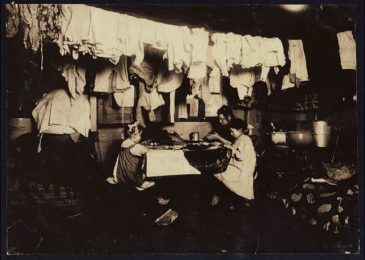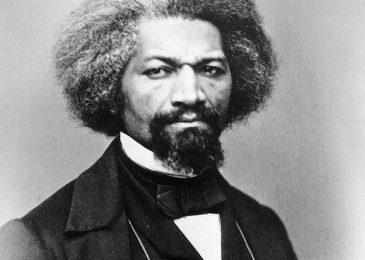Today the film The Birth of a Nation premieres, depicting Nat Turner’s slave insurrection in Southampton County, Virginia, in August 1831 when Turner was 30 years old.
[youtube https://youtu.be/XtXCS_plrzQ]
Although there are no photographs of Nat Turner, a fairly detailed description of was included in a $500 ($13,000 in today’s money) reward notice published in the Washington, D.C., National Intelligencer on September 24, 1831.
Here is what they listed (exact quotes, under my categories):
Height and weight:
- 5 feet 6 or 8 inches high
- weighs between 150 and 160 pounds
Skin tone:
- rather bright complexion, but not a mulatto,
Build and physical features:
- broad shoulders
- a large knot on one of the bones of his right arm, near the wrist, produced by a blow
- rather knockkneed
- broad flat feet
Facial features:
- larger flat nose
- large eyes
- hair on the top of the head very thin
- no beard, except on the upper lip and the top of the chin
- a scar on one of his temples, also one on the back of his neck
Description of his movement:
- walks brisk and active
It seems to me that to describe this merely as an “uprising” or an “insurrection” or a “revolt” is to miss the grotesque particulars of the actions from Turner and his fellow slaves. As slaves, they were unrighteously oppressed as victims. But in response, they did more than rebel against an authority; Turner and company sadistically and remorselessly murdered not only slave owners, but also their wives and children—including infants.
Here is a flavor of the horror, in Turner’s own words:
I entered my master’s chamber, it being dark, I could not give a death blow, the hatchet glanced from his head, he sprang from the bed and called his wife, it was his last word, Will laid him dead, with a blow of his axe, and Mrs. Travis shared the same fate, as she lay in bed. The murder of this family, five in number, was the work of a moment, not one of them awoke; there was a little infant sleeping in a cradle, that was forgotten, until we had left the house and gone some distance, when Henry and Will returned and killed it. . . .
We started from there for Mrs. Reese’s, maintaining the most perfect silence on our march, where finding the door unlocked, we entered, and murdered Mrs. Reese in her bed, while sleeping; her son awoke, but it was only to sleep the sleep of death, he had only time to say who is that, and he was no more. . . .
As I came round to the door I saw Will pulling Mrs. Whitehead out of the house, and at the step he nearly severed her head from her body, with his broad axe. Miss Margaret, when I discovered her, had concealed herself in the corner, formed by the projection of the cellar cap from the house; on my approach she fled, but was soon overtaken, and after repeated blows with a sword, I killed her by a blow on the head, with a fence rail. . . .
By my count, of the 55 who died, 12 were men, 17 were women, and 26 were children. (Their ages aren’t listed, so it’s possible that some of the “sons and daughters” I’ve counted as adults were actually children.)
Especially distributing, Turner—a Baptist preacher—believed that God had specifically set him apart and called him to this great purpose.
After 70 days on the run, Turner allowed himself to be captured on October 30, 1831.
On the evening of Tuesday, November 1, the day Turner was committed to prison, white 30-year-old lawyer Thomas Gray—who defended many of the slaves in the trial—visited Turner in his cell and recorded his recollections of how this all came to pass.
That Saturday, November 5, the testimony was read aloud to Turner in court, who did not dispute its accuracy or care to supplement it in any way.
Turner was executed at noon on November 11, and his Confessions were published in December by Gray, who wrote: “I determined for the gratification of public curiosity to commit his statements to writing, and publish them, with little or no variation, from his own words.”
Gray reflected on Turner’s chilling demeanor in recounting what happened:
The calm, deliberate composure with which he spoke of his late deed and intentions, the expression of his fiend-like face when excited by enthusiasm, still bearing the stains of the blood of helpless innocence about him; clothed with rags and covered with chains; yet daring to raise his manacled hands to heaven, with a spirit soaring above the attributes of man; I looked on him and my blood curdled in my veins.
1. Turner saw himself as a prophet from a young age.
In my childhood a circumstance occurred which made an indelible impression on my mind, and laid the groundwork of that enthusiasm which has terminated so fatally to many, both white and black, and for which I am about to atone at the gallows. It is here necessary to relate this circumstance. Trifling as it may seem, it was the commencement of that belief which has grown with time; and even now, sir, in his dungeon, helpless and forsaken as I am, I cannot divest myself of.
Being at play with other children, when three or four years old, I was telling them something, which my mother, overhearing, said it had happened before I was born. I stuck to my story, however, and related some things which went, in her opinion, to confirm it. Others being called on, were greatly astonished, knowing that these things had happened, and caused them to say, in my hearing, I surely would be a prophet, as the Lord had shown me things that had happened before my birth.
2. Turner believed from a young age he was intended for some great purpose.
And my mother and grandmother strengthened me in this my first impression, saying, in my presence, I was intended for some great purpose, which they had always thought from certain marks on my head and breast. . . .
3. Turner believed he had been gifted with unusual intelligence, which was the object of wonder from others, and he devoted concentrated time to prayer and being attentive and imaginative.
My grandmother, who was very religious, and to whom I was much attached—my master, who belonged to the church, and other religious persons who visited the house, and whom I often saw at prayers, noticing the singularity of my manners, I suppose, and my uncommon intelligence for a child, remarked I had too much sense to be raised, and, if I was, I would never be of any service to any one as a slave.
To a mind like mine, restless, inquisitive, and observant of everything that was passing, it is easy to suppose that religion was the subject to which it would be directed; and, although this subject principally occupied my thoughts, there was nothing that I saw or heard of to which my attention was not directed. The manner in which I learned to read and write, not only had great influence on my own mind, as I acquired it with the most perfect ease,—so much so, that I have no recollection whatever of learning the alphabet; but, to the astonishment of the family, one day, when a book was shown me, to keep me from crying, I began spelling the names of different objects. This was a source of wonder to all in the neighborhood, particularly the blacks—and this learning was constantly improved at all opportunities. When I got large enough to go to work, while employed I was reflecting on many things that would present themselves to my imagination; and whenever an opportunity occurred of looking at a book, when the school-children were getting their lessons, I would find many things that the fertility of my own imagination had depicted to me before. All my time, not devoted to my master’s service, was spent either in prayer, or in making experiments in casting different things in moulds made of earth, in attempting to make paper, gunpowder, and many other experiments, that, although I could not perfect, yet convinced me of its practicability if I had the means.
4. Turner believed he had superior judgement and greatness, so he devoted himself to fasting and prayer, wrapped himself in mystery, and avoided mixing with people in society.
I was not addicted to stealing in my youth, nor have ever been; yet such was the confidence of the Negroes in the neighborhood, even at this early period of my life, in my superior judgment, that they would often carry me with them when they were going on any roguery, to plan for them.
Growing up among them with this confidence in my superior judgment, and when this, in their opinions, was perfected by Divine inspiration, from the circumstances already alluded to in my infancy, and which belief was ever afterwards zealously inculcated by the austerity of my life and manners, which became the subject of remark by white and black; having soon discovered to be great, I must appear so, and therefore studiously avoided mixing in society, and wrapped myself in mystery, devoting my time to fasting and prayer.
5. Turner believed that he encountered the Spirit through a revelation in his early 20s, confirming his sense that he was ordained by God for a great purpose.
By this time, having arrived to man’s estate, and hearing the Scriptures commented on at meetings, I was struck with that particular passage which says, “Seek ye the kingdom of heaven, and all things shall be added unto you” [Matt. 6:33]. I reflected much on this passage, and prayed daily for light on this subject. As I was praying one day at my plough, the Spirit spoke to me, saying, “Seek ye the kingdom of heaven, and all things shall be added unto you.”
[Gray asks Turner what he means by “the spirit.” Turner responds: “The Spirit that spoke to the prophets in former days.”]
I was greatly astonished, and for two years prayed continually, whenever my duty would permit; and then again I had the same revelation, which fully confirmed me in the impression that I was ordained for some great purpose in the hands of the Almighty.
Several years rolled round, in which many events occurred to strengthen me in this my belief. At this time I reverted in my mind to the remarks made of me in my childhood, and the things that had been shown me; and as it had been said of me in my childhood, by those by whom I had been taught to pray, both white and black, and in whom I had the greatest confidence, that I had too much sense to be raised, and if I was I would never be of any use to any one as a slave; now, finding I had arrived to man’s estate, and was a slave, and these revelations being made known to me, I began to direct my attention to this great object, to fulfill the purpose for which, by this time, I felt assured I was intended.
Knowing the influence I had obtained over the minds of my fellow-servant (not by the means of conjuring and such like tricks—for to them I always spoke of such things with contempt), but by the communion of the Spirit, whose revelations I often communicated to them, and they believed and said my wisdom came from God,— I now began to prepare them for my purpose, by telling them something was about to happen that would terminate in fulfilling the great promise that had been made to me.
About this time I was placed under an overseer, from whom I ran away, and after remaining in the woods thirty days, I returned, to the astonishment of the Negroes on the plantation, who thought I had made my escape to some other part of the country, as my father had done before. But the reason of my return was, that the Spirit appeared to me and said I had my wishes directed to the things of this world, and not to the kingdom of heaven, and that I should return to the service of my earthly master—”For he who knoweth his Master’s will, and doeth it not, shall be beaten with many stripes, and thus have I chastened you.” And the Negroes found fault, and murmured against me, saying that if they had my sense they would not serve any master in the world. And about this time I had a vision—and I saw white spirits and black spirits engaged in battle, and the sun was darkened—the thunder rolled in the heavens, and blood flowed in streams-and I heard a voice saying, “Such is your luck, such you are called to see; and let it come rough or smooth, you must surely bear it.”
I now withdrew myself as much as my situation would permit from the intercourse of my fellow-servants, for the avowed purpose of serving the Spirit more fully; and it appeared to me, and reminded me of the things it had already shown me, and that it would then reveal to me the knowledge of the elements, the revolution of the planets, the operation of tides, and changes of the seasons. After this revelation in the year 1825, and the knowledge of the elements being made known to me, I sought more than ever to obtain true holiness before the great day of judgment should appear, and then I began to receive the true knowledge of faith. And from the first steps of righteousness until the last, was I made perfect; and the Holy Ghost was with me, and said, “Behold me as I stand in the heavens.” And I looked and saw the forms of men in different attitudes; and there were lights in the sky, to which the children of darkness gave other names what they really were; for they were the lights of the Savior’s hands, stretched forth from east to west, even as they were extended on the cross on Calvary for the redemption of sinners. And I wondered greatly at these. miracles, and prayed to be informed of a certainty of the meaning thereof; and shortly afterwards, while laboring in the field, I discovered drops of blood on the corn, as though it were dew from heaven; and I communicated it to many, both white and black, in the neighborhood-and I then found on the leaves in the woods hieroglyphic characters and numbers, with the forces of men in different attitudes, portrayed in blood, and representing the figures I had seen before in the heavens. And now the Holy Ghost had revealed itself to me, and made plain the miracles it had shown me; for as the blood of Christ had been shed on this earth, and had ascended to heaven for the salvation of sinners, and was now returning to earth again in the form of dew,—and as the leaves on the trees bore the impression of the figures I had seen in the heavens,—it was plain to me that the Savior was. about to lay down the yoke he had borne for the sins of men, and the great day of judgment was at hand.
About this time I told these things to a white man (Etheldred T. Brantley), on whom it had a wonderful effect; and he ceased from his wickedness, and was attacked immediately with a cutaneous eruption, and blood oozed from the pores of his skin, and after praying and fasting nine days he was healed. And the Spirit appeared to me again, and said, as the Savior had been baptized, so should we be also; and when the white people would not let us be baptized by the church, we went down into the water together, in the sight of many who reviled us, and were baptized by the Spirit. After this I rejoiced greatly, and gave thanks to God.
Turner believes that the Spirit appeared to him on May 12, 1828.
And on the 12th of May, 1828, I heard a loud noise in the heavens, and the Spirit instantly appeared to me and said the Serpent was loosened, and Christ had laid down the yoke he had borne for the sins of men, and that I should take it on and fight against the Serpent, for the time was fast approaching when the first should be last and the last should be first.
[Gray asks, “Do you not find yourself mistaken now?” Turner answers rhetorically: “Was not Christ crucified?”]
And by signs in the heavens that it would make known to me when I should commence the great work, and until the first sign appeared I should conceal it from the knowledge of men; and on the appearance of the sign (the eclipse of the sun, last February *), I should arise and prepare myself, and slay my enemies with their own weapons. And immediately on the sign appearing in the heavens, the sea] was removed from my lips, and I communicated the great work laid out for me to do, to four in whom I had the greatest confidence (Henry, Hark, Nelson, and Sam). It was intended by us to have begun the work of death on the 4th of July last. Many were the plans formed and rejected by us, and it affected my mind to such a degree that I fell sick, and the time passed without our coming to any determination how to commence—still forming new schemes and rejecting them, when the sign appeared again, which determined me not to wait longer.



